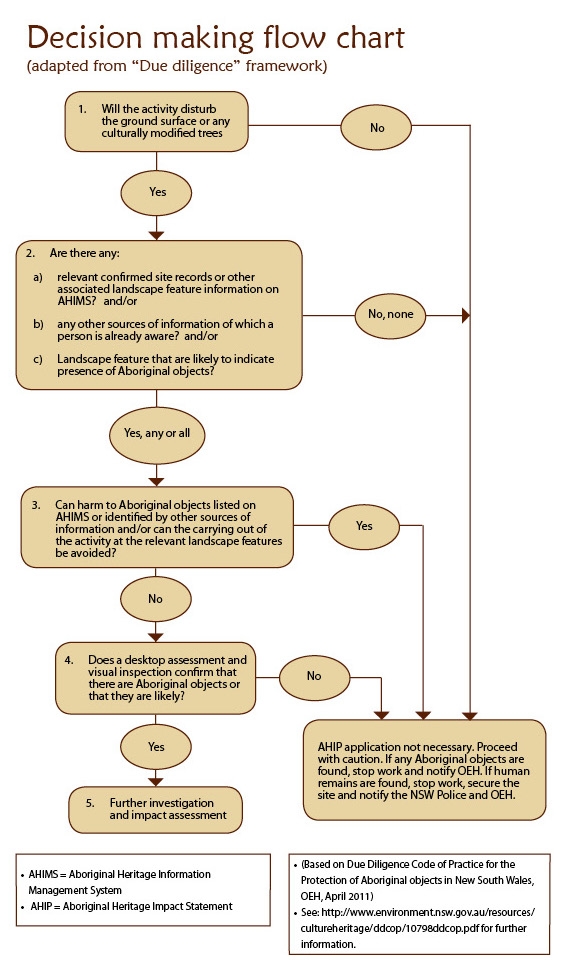Finding Cultural Heritage on your property
Finding and reporting a place or object on private, freehold land gives you the chance to join with many other landholders who find they are able to protect a special place or item from harm.
There is no legislation in NSW or Australia that allows Aboriginal people to make any claim over private freehold land, even if the property contains Aboriginal sites and cultural values or has high significance to the local Aboriginal community. In the majority of cases, having Aboriginal sites on a property will not affect ownership, or prevent existing land use from continuing.
First steps when finding a site or object
Step 1: Don't disturb the site or remove any artefacts or objects.
Step 2: Make a record of the site or object by taking photographs, recording the position (i.e. property location, paddock and where it is sitting in the landscape) and write a description of your find.
Step 3: Report your find to the Local Aboriginal Land Council (LALC) in your area or to Northern Tablelands Local Land Services.
Preserving Aboriginal Cultural Heritage on your property
To help preserve Aboriginal cultural heritage on your property it is recommended to assess the site prior to any development or change of land use. Through a simple assessment process you can determine whether the planned development or land use is likely to damage or destroy any items of importance before the development or change begins.
In NSW, the protection and preservation of Aboriginal objects and places falls within the National Parks and Wildlife Act (NPW) 1974. The NPW Act 1974 is administered by the Office of Environment and Heritage (OEH). They are responsible for protecting and managing items of Aboriginal cultural heritage in NSW.
Sites are recorded on the Aboriginal Heritage Information Management System (AHIMS). This database contains information about Aboriginal objects and places that have been registered within New South Wales.
Reporting your site
After reporting your find, the reporting body (e.g. Local Aboriginal Land Council, Archaeologists or the Northern Tablelands Local Land Services) will:
- Arrange with you to visit the site to further examine and confirm your findings.
- Access the Aboriginal Heritage Information Management System (AHIMS) database to see if there are any past recorded findings on the property. You may request a copy of this report for your records.
- Arrange to secure the site, if applicable, to prevent erosion or any possible degradation, until a formal agreement has been reached for managing the site.
- Arrange formal recording through AHIMS, if the find is substantiated and of significance.
As applicable follow the procedures under the "Due Diligence" code of practice (see diagram below).
Using the Due Diligence Framework
"Due Diligence" is the term used for assessing the effects of development or work activities on Aboriginal sites.
Before you start any on-ground activities you must show that you have assessed the likelihood of these activities damaging or moving objects or places of Aboriginal cultural heritage.
Use this flow chart to help guide you through the Due Diligence process. Please contact OEH or the Northern Tablelands Local Land Services for more information relating to the Due Diligence framework and how it applies to your situation.
Seeking support and advice
Local Aboriginal Land Councils
Local Aboriginal Land Councils consist of members of the local Aboriginal community. They can give advice and provide contacts and often have traditional knowledge regarding the local area and resource use.
Anaiwan (Inverell/Tingha), 02 6723 3022
Armidale, 02 6772 2447
Ashford, 02 6725 4411
Glen Innes, 02 6732 1150
Guyra, 02 6779 1803
Moombahlene (Tenterfield), 02 6736 3219
Amaroo (Walcha), 02 6777 1100
Northern Tablelands Local Land Services
The Northern Tablelands Local Land Services can provide advice on the due diligence process and can support the identification of objects and sites. There are also Aboriginal staff who can assist with this process.
Visit one of your Northern Tablelands Local Land Services offices or call 02 6728 8020 and be directed to someone who can help you with your enquiry.
